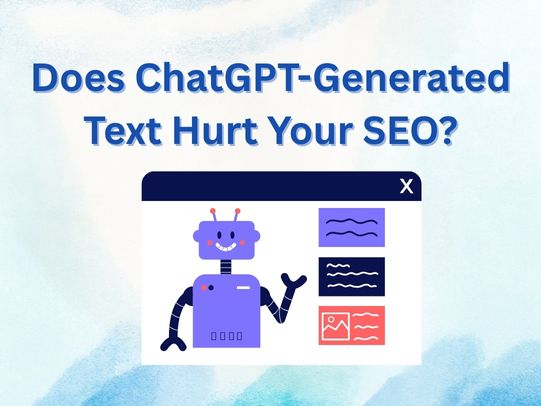With the growing popularity of AI writing tools like ChatGPT, marketers, bloggers, and content creators are increasingly asking:
“Will AI-generated content hurt my website’s SEO?”
The answer isn’t a flat yes or no-because it depends on how the content is used. When handled correctly, AI-generated text can support SEO goals, but misused, it can backfire.
In this guide, we’ll break down how search engines view AI-generated content, when it can harm or help your rankings, and how to use tools like ChatGPT responsibly for SEO success.
How Google Views AI-Generated Content in 2025
Google’s Official Statement on AI Content
Google’s stance has evolved. As of recent updates, Google doesn’t penalize content simply for being AI-generated. What matters most is the quality and usefulness of the content.
From Google’s Search Central Blog:
“Using automation-including AI-to generate content with the primary purpose of manipulating ranking in search results is a violation of our spam policies. However, not all use of AI is considered spam.”
Semantic Keywords to Keep in Mind:
- AI content guidelines
- Google ranking factors
- Helpful content update
- AI and E-E-A-T
- SEO with automation
When ChatGPT-Generated Text Can Hurt SEO
Even though AI itself isn’t penalized, the way you use it can negatively impact your site. Here are the common pitfalls:
1. Low-Quality or Generic Content
Example: A 300-word article on “What is SEO?” filled with basic definitions and no new insight will struggle to rank-even if it’s 100% AI-written.
Google prioritizes depth, specificity, and usefulness. Thin content that doesn’t solve user problems or offer actionable info performs poorly.
2. Lack of Originality
If your content is just a paraphrased version of top-ranking articles, it won’t provide any added value. Even AI can recognize redundancy.
3. Factual Inaccuracies
ChatGPT, like all LLMs, can hallucinate facts. Publishing inaccurate or misleading content can damage trust and rankings.
Example: Stating that Google ranks content based on the number of words rather than value-this would mislead users and misrepresent SEO logic.
4. Over-Optimization
AI tools may create content that unnaturally forces in keywords.
Example:
Bad: “This SEO content writing article about SEO content for SEO writers is SEO focused.”
Good: “This guide helps SEO writers understand how AI tools like ChatGPT affect search rankings.”
5. No Human Touch (Fails E-E-A-T)
AI content often lacks real-life examples, experience, or expert commentary, which are core parts of Google’s E-E-A-T guidelines (Experience, Expertise, Authoritativeness, Trust).
How to Use AI Tools to Speed Up Guest Post Writing
When ChatGPT Content Can Help SEO
AI tools can be incredibly useful when used strategically and with human editing. Here’s how:
1. Scalability
You can cover more topics in less time-useful content calendars, SEO campaigns, or FAQs.
2. Content Planning
ChatGPT is ideal for:
- Blog topic ideation
- Structuring long-form content
- Creating SEO-friendly titles and meta descriptions
Example:
Prompt: “Give me a blog outline on ‘How to Get Rid of a Migraine Fast: Quick Relief That Works’ with SEO in mind.”
Output: A structured outline including subtopics, questions, and long-tail keywords.
3. Drafting & Research
Use AI for first drafts, and follow up with manual review and personalization.
Example: ChatGPT can write a “Spring Cleaning Checklist” blog draft. You can then add real product links, local data, and testimonials.
4. Content Optimization
AI helps with:
- Readability improvements
- Schema markup suggestions
- Internal linking strategy
Best Practices: Using ChatGPT Without Hurting SEO
To avoid penalties or ranking drops, follow these guidelines:
✔️ Always Edit & Fact-Check
AI is a tool-not a final product. Human oversight is mandatory for quality, accuracy, and tone.
✔️ Add Your Voice & Experience
Boost E-E-A-T by:
- Sharing personal insights or expert commentary
- Including original data or case studies
- Writing in a brand-specific tone
✔️ Use Tools Like Grammarly + SEO Plugins
Ensure content is free of errors and optimized using tools like:
- Yoast SEO
- Surfer SEO
- Clearscope
✔️ Use AI for Research, Not Plagiarism
Never copy and paste from AI without customization. Always add new insights, stats, or updated info.
Real-World Use Case
Business Type: Fitness Coach
Problem: Needed 15 blog posts for ranking in a competitive niche
Approach:
- Used ChatGPT to generate first drafts and topic clusters
- Personalized with real transformation stories and exercise tips
- Used Surfer SEO to fine-tune keyword density and headings
Result:
Website traffic increased by 42% in 90 days.
Frequently Asked Questions (FAQ)
Q1: Can Google detect AI-generated content?
A: Possibly, but Google doesn’t penalize content just for being AI-generated. It penalizes low-value, spammy, or manipulative content.
Q2: Will using ChatGPT alone get my content to rank?
A: No. AI content needs editing, expertise, and optimization to perform well in search.
Q3: Can I use ChatGPT for writing product descriptions or landing pages?
A: Yes, but ensure they’re unique, persuasive, and tailored to your brand’s tone.
Q4: Is AI content better than hiring a writer?
A: AI is faster, but lacks creativity and human emotion. A hybrid approach (AI + human) works best for SEO and engagement.
Q5: What’s the biggest mistake when using AI for SEO?
A: Publishing unedited, generic, or factually incorrect content without reviewing or personalizing it.
Conclusion: ChatGPT and SEO Can Work Together
ChatGPT doesn’t hurt your SEO if used correctly. The real threat lies in lazy publishing and unreviewed automation. Search engines continue to evolve, and so must marketers.


